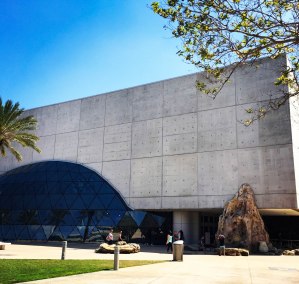By Berna Ozunal
This year, 591 people travelled to St. Petersburg, Florida, for the annual American Copy Editors Society (ACES) conference held from March 23 to 25 at the Hilton St. Petersburg Bayfront Hotel—the second-highest attendance ever.
I went to St. Pete’s for a few reasons this year: I enjoyed last year’s conference in Portland and learned a lot, I seriously needed to “defrost,” and I was presenting a session.
Located on Florida’s Gulf Coast, St. Petersburg has a population of just over 250,000. From the Tampa International Airport, it’s just a 30-minute taxi or shuttle ride to the hotel.
I was told that March is the perfect time to travel to Florida, and it’s true. With highs between 24ºC and 28ºC, you are transported to another dimension—one where people do not walk around half the year swaddled like mummies in wool and down.

Bleisure
Bleisure is when you work some leisure into a business trip. For many, the conference is a business trip, as it’s an investment in themselves, their businesses, and their careers. But when you’re in Florida, why wouldn’t you want to throw in some leisure? Some ACES folks went swimming at the St. Pete’s Beach with its beautiful white sand. (I heard of one sighting of a pod of wild dolphins). With the very little extra time I had, I hit the Dali Museum, which was pretty much right across the street from the hotel. This museum houses more than 2,100 pieces of Dali’s iconic artwork. It was good timing, too, because there was a special Frida Kahlo exhibit on. Aside from the beaches and museums, St. Pete’s has botanical gardens, parks, nature and wildlife preserves, street markets, and much more. And, whenever you find yourself in a tropical place, there is always that tried-and-true practice of grabbing a drink and a hammock and becoming perfectly useless for a little while.

The day before the conference, a “Great Bosses Boot Camp” session was offered. I did not go to this, but these preconference boot camps are a great idea for those who are eager to get started.
The world needs editors
It seems like now, more than ever, the world needs editors. In an “alternative facts” and “fake news” universe, editors help preserve clarity, truth, and logic. Sessions like “Don’t Get Fooled: How to Spot Bad Information and Fake News” and “Truthful Copy in a Post-Trust Age” addressed these new realities.
Also, in a world where people are able to publish as fast as they can think—and sometimes faster—being conscious of the language we use so that it is inclusive and respectful is incredibly important. One of the first sessions I attended was “Is This Racist? How Editors Can Identify Hidden Bias in Language,” presented by a great panel that included Karen Yin, founder of The Conscious Style Guide. This guide is much needed and extremely useful. The session itself was very illuminating. By the end of it, it was very clear how some of the unconscious choices we make in our language can reveal biases so entrenched you need special lenses to see them—yet they’re there, and they’re harmful.
In sessions like “Latest Research on Editing” and “What’s Taught in Editing Courses? And What Should Be,” one important takeaway was how little of an emphasis there is on numeracy for editors. Editors don’t have to be mathematicians, but they should not neglect this important aspect of the work they do. Another issue was that many people think that editors are only concerned with grammar, thinking us to be little more than pedants or, as John McIntyre put it at the recent Editors Canada conference, fussbudgets—and this is not true at all. Knowing grammar is essential, but it’s not what editors should be focusing on—accurate and effective communication is. To the extent that grammar can aid this, it’s important. To the extent that it impedes this, it’s not.
Going grammando
We had an excellent keynote speaker—Anne Curzan, linguist and professor of English at the University of Michigan. Her talk, titled “Going Grammando: A Linguist’s Look at Language Peeves,” was lively and educational. Grammando is a term that Curzan wants to replace grammar Nazi or grammar police with, and for good reason. I think this is a great portmanteau—much better than bleisure! Let me be clear: I think the term is great, but actually “going grammando” isn’t. We all have certain linguistic…hang-ups, let’s say. Certain preferences. But correcting other people’s grammar, unless you’re being asked or paid to do so, is not a worthwhile preoccupation.
Chicago
Last year, when I wrote about the conference in Portland, I threw out a bunch of reasons for going to St. Pete’s and suggested it was worth considering. But if you can budget it in, I feel like it’s a no-brainer for Canadians to go to the Chicago conference in 2018. With so many authoritative people in the field attending and presenting, including lexicographers, academics, practitioners, and publishers, it’s an incredible learning opportunity. You can already register, if you want in early. Hope to see you there!
Berna Ozunal is a senior editor specializing in the advertising, marketing, design, corporate, and non-profit sectors. Connect with her on Twitter and LinkedIn .
This article was copy edited by Ellen Fleischer.
